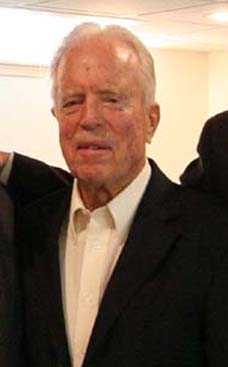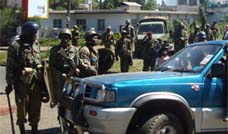
But how could someone so hard of hearing get into the Peace Corps, let alone learn a foreign language and communicate in it? Mr. Swiller told me he had no problem with the interview, which was conducted one-on-one in a quiet room, enabling him to hear and to read lips. Through the devoted efforts of an audiologist and his mother, he could speak nearly as well as a normal-hearing person. And he did not have a problem learning the language of Zambia. “I was so used to paying close attention when other people spoke,” Mr. Swiller recalled in an interview. “I was used to asking people to repeat themselves.” He added: “Being deaf and having three brothers, one of whom is also deaf, I learned how to communicate without language. I could conduct conversations when I understood only a few words in each sentence.”
Zambia RPCV Josh Swiller has Cochlear Implant
Cochlear Implant Supports an Author’s Active Life
By JANE E. BRODY
Josh Swiller was 22 and profoundly deaf when he applied to the Peace Corps in search of adventure. And indeed, adventure he found. His experiences in Zambia are eloquently recounted in his hard-to-put-down memoir of deafness and Africa, “The Unheard” (Holt, 2007).
But how could someone so hard of hearing get into the Peace Corps, let alone learn a foreign language and communicate in it? Mr. Swiller told me he had no problem with the interview, which was conducted one-on-one in a quiet room, enabling him to hear and to read lips. Through the devoted efforts of an audiologist and his mother, he could speak nearly as well as a normal-hearing person. And he did not have a problem learning the language of Zambia.
“I was so used to paying close attention when other people spoke,” Mr. Swiller recalled in an interview. “I was used to asking people to repeat themselves.”
He added: “Being deaf and having three brothers, one of whom is also deaf, I learned how to communicate without language. I could conduct conversations when I understood only a few words in each sentence.”
That was remarkable in itself. But far more remarkable is that the interview with me was conducted over the telephone, something Mr. Swiller, 37, could not have done three years ago. In 2005, he and his brother underwent life-changing surgery, substituting a cochlear implant for the hearing aids that were no longer working for them.
“Thirty years of amplified sound had worn out our ears,” he explained. “In most people with sensorineural hearing loss, their hearing gets worse with time and they need stronger and stronger amplification. We started getting terrible headaches all the time, and I finally had to stop using the aids altogether.”
Opened a ‘Whole New World’
During those two soundless years, Mr. Swiller, who was fluent in sign language, attended the Lexington School for the Deaf, in Jackson Heights, Queens, and the League for the Hard of Hearing, in Manhattan, and earned a master’s degree in social work. He now works part-time as a hospice social worker, a job he could not have held before the implant because it involves talking to sick people and lots of time on the telephone. His brother, now married and a real estate entrepreneur, does much of his work through conference calls.
“The implant opened up a whole new world for me,” a world that now includes a normal-hearing girlfriend who mumbles, Mr. Swiller said, laughing.
With the implant, Mr. Swiller’s hearing went from 25 percent to 100 percent. The deafness inherited by Mr. Swiller, his brother and one of their first cousins is caused by an autosomal recessive mutation in a gene called connexion 26, the most common cause of sensorineural deafness in children.
Sensorineural hearing loss affects one to three of every thousand children born in developed countries, according to a report in the Dec. 6 issue of The New England Journal of Medicine. Hearing aids are helpful when the deficit is mild to moderate, but are less effective or ineffective when hearing loss is severe.
Candidates for cochlear implants have severe sensorineural hearing loss in both ears but still have a healthy auditory nerve. A tiny microphone worn behind the ear picks up and amplifies noises filtered through a sound processor that gives priority to speech. The resulting signals are sent electromagnetically to a receiver and stimulator implanted under the skin. The signals are converted to electrical impulses and sent to the brain via the auditory nerve.
At least one company, Otologics, has developed a cochlear implant that is placed entirely under the skin, but it is not yet approved for use in the United States. Mr. Swiller sees some advantages to the external receiver, which, for example, is easily removed for showering or swimming. “One of my favorite things is the ability to turn it off,” he said. “On the subway, it’s off.”
Mr. Swiller explained that the device also has built-in flexibility with four different programs, each with its own volume and sensitivity control: “In addition to the base program, one makes speech frequencies louder, which is useful at a lecture or a meeting at work; another turns off all the microphones except the one picking up the voice of the person I’m looking at, which makes it easier to hear in a noisy environment; and a fourth cuts the microphone pickup to a three-to-four-foot radius.”
“My hearing is so many light-years better than I ever could have imagined — it’s a miracle,” Mr. Swiller said. “Before the implant, I couldn’t talk on the phone, I couldn’t have a conversation. It was very frustrating to be in the world and not in the world, watching people talking and not being able to follow what they were saying.”
Not an Easy Decision
Some deaf people are opposed to cochlear implants, because they regard the world of the deaf as a community, which they believe that implants threaten. They also point out that the devices are still being perfected.
Nonetheless, Mr. Swiller says based on his experience, “a small child with severe hearing loss should be implanted as soon as possible. Sign language can be learned down the road, but not English. It’s a no-brainer to me if you want the child to succeed in a hearing world.”
Mr. Swiller recalled meeting a deaf high school girl who received the implants at age 2. He said she was doing well academically, captain of her basketball team and confident in social situations. Because of cochlear implants, he said, deaf schools around the country are rapidly losing enrollment.
Before his surgery, Mr. Swiller did a lot of homework. He read “Rebuilt,” a book by Michael Chorost about his experience with an implant. He also attended a support group at the League for the Hard of Hearing where people with implants spoke positively about them. Still, after much testing for eligibility and deciding to get the implant, Mr. Swiller said he had to wait several months to be sure he would not change his mind. Then a month of healing followed the surgery before the device was turned on.
“The first week was a real disappointment,” Mr. Swiller recalled. “All I heard was nonsense. My brain was like a muscle that needed to be strengthened and increase its tolerance for this new stimulus.”
“The first sound I heard was ‘sh’ — I’d never heard that or ‘s’ before,” he continued. “Then one day, I passed someone on the street talking on a cellphone, and I heard everything she said crystal clear. That had never happened before — hearing something when I was not paying attention to the sound. I can now hear conversations from another room; before I couldn’t hear distant speech at all.”
Mr. Swiller’s surgeon, Dr. J. Thomas Roland Jr., co-director of the cochlear implant center at New York University, said in an interview that universal screening of newborns had made it possible to detect deafness by one month of age, making cochlear implantation in infants one of the latest trends. Other trends are getting implants in both ears and implanting older adults — including those over 70 — for whom hearing aids are no longer adequate.










